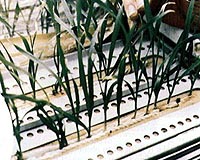 |
Houston TX (SPX) Aug 19, 2009 After nearly four years of joint research of Houston-based AmeriSciences and NASA / Johnson Space Center (JSC), a senior NASA medical officer has confirmed that two of the resulting nutritional supplement formulas were used and tested in space by the astronauts of mission STS-125 of May 11, 2009 and the mission STS-127 of July 15, 2009 and are now in use and testing aboard the International Space Station. This marks a milestone in the advancement of a project between AmeriSciences and NASA/JSC to develop nutritional supplements for the astronauts to meet the needs of long-duration spaceflight as well as conditioning here on Earth. Commenced through a Space Act Agreement between AmeriSciences and NASA/JSC back in the fall of 2005, this joint research effort has now progressed to in-flight testing as well as clinical ground studies to determine safety and effectiveness of the resulting formulations. "NASA/JSC has always had to push forward with new technologies to meet the extreme conditions of outer space ... nutritional supplementation is another one of those areas of technology in which NASA can make a significant contribution to society as a whole while promoting the health of the participants in their space program," comments Lou Gallardo, Chairman of AmeriSciences. "We are proud to be working closely with NASA/JSC on this project and combining all of our expertise to create the best products possible for the astronauts." The years of preparation and research by experts from both AmeriSciences and NASA has led to the use and testing of antioxidant and multivitamin formulations aboard the Space Shuttle and International Space Station. The commencement of use and testing of these formulas on Space Shuttle mission STS-125 was important to said research as this mission to repair the Hubble Space Telescope presented extra physiological challenges. Prolonged Extra-Vehicular Activities (EVAs or "spacewalks") and the high-orbit location of the telescope exposed the astronauts to an increased risk of higher levels of radiation and other medical concerns. "This is just the first step towards preparing for the rigors of long-duration space flight on the human body," explains Gallardo, "the good news is that the results from this research can impact everyone's health here on Earth." AmeriSciences currently markets versions of the two formulas used on these missions. They are marketed as AmeriSciences Omega Max (an Omega 3 fatty acid supplement) and AmeriSciences Premium Multivitamin. Share This Article With Planet Earth
Related Links AmeriSciences Space Tourism, Space Transport and Space Exploration News
 Astronauts May Get Their Wheaties
Astronauts May Get Their WheatiesMoffett Field CA (SPX) Jul 17, 2009 Does a sandwich on Mars taste different? The answer could be no, according to new research that found long-term spaceflight exposure doesn't change later generations of wheat seeds. Molecular biologist Robert Ferl of the University of Florida and colleagues studied wheat seeds descended from plants that flew on the Russian Mir space station. The progenitor plants were in space for 167 days ... read more |
|
| The content herein, unless otherwise known to be public domain, are Copyright 1995-2009 - SpaceDaily. AFP and UPI Wire Stories are copyright Agence France-Presse and United Press International. ESA Portal Reports are copyright European Space Agency. All NASA sourced material is public domain. Additional copyrights may apply in whole or part to other bona fide parties. Advertising does not imply endorsement,agreement or approval of any opinions, statements or information provided by SpaceDaily on any Web page published or hosted by SpaceDaily. Privacy Statement |